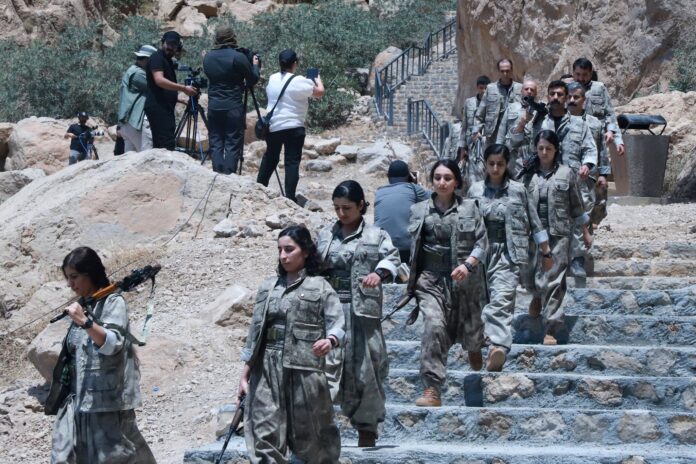The Kurdish Workers’ Party (PKK) has officially declared the withdrawal of all its forces from Turkish soil to northern Iraq, a move presented as a step toward peace. But as ever with the PKK and Ankara, nothing is quite as it seems. Behind the announcements, ceremonies, and photo ops lies a complex web of pressure, geopolitical repositioning, and strategic calculation. This is not merely a military maneuver, it’s a symbolic shift loaded with uncertainty.
What Happened? The PKK’s Sudden Move
On October 26, 2025, during a highly publicized ceremony in Sulaymaniyah, in Iraqi Kurdistan, PKK officials confirmed they had begun withdrawing their combat units from Turkey. The group published images of 25 fighters, including eight women, already resettled in Iraq. Observers estimate the total number of withdrawing forces to be between 200 and 300 fighters, though exact figures remain unconfirmed.
The declaration was accompanied by a renewed call on Ankara to implement “without delay” the legal framework necessary to pursue the peace process.
Turkish President Recep Tayyip Erdogan welcomed the announcement, citing “concrete progress” in ending a conflict that has claimed over 50,000 lives and drained the Turkish economy of billions over four decades.
Context, One Year into a Fragile Peace
This latest development follows a series of indirect negotiations initiated in October 2024, culminating in the PKK’s announcement of its dissolution in May 2025. That move came in response to an appeal by the group’s imprisoned founder, Abdullah Öcalan, who has long advocated for a political solution.
Earlier this year, a symbolic disarmament ceremony saw dozens of PKK fighters burn their weapons in a show of commitment to peace. Ankara, meanwhile, established a parliamentary commission tasked with designing the legal architecture for reconciliation, including potential legislation on amnesty, political participation, and the use of the Kurdish language in public life.
But none of this is irreversible. As of now, Öcalan remains imprisoned on Imrali Island, though he was recently allowed to meet his lawyers for the first time in six years.
Strategic Retreat or Calculated Pause?
Many analysts caution against reading this as the end of the Kurdish insurgency. Rather, the PKK withdrawal from Turkey may reflect a temporary repositioning driven by both external pressure and internal fatigue.
Years of guerrilla warfare have worn down the group militarily and politically. Kurdish populations across southeastern Turkey, roughly 20% of the national demographic, are also war-weary and increasingly focused on civilian political representation through the pro-Kurdish DEM party, now the third largest force in the Turkish parliament.
Yet, there’s little room for complacency. The relocation of fighters to northern Iraq revives concerns over the group’s continued ability to regroup, recruit, and potentially relaunch operations should talks fail.
Conditions and Demands, What the PKK Wants
PKK leaders, including Devrim Palu and Sabri Ok, have stated clearly: the withdrawal is conditional, not capitulative. Their key demands include:
- Legally codified guarantees for militants seeking political integration
- Specific laws enabling Kurdish political participation, beyond mere general amnesty
- The release of Abdullah Öcalan, whom the group sees as essential to peace
“We want peace, but we want it with freedom and dignity,” Sabri Ok told reporters on-site. The ball, clearly, is now in Ankara’s court.
What Happens Next?
- Implementation of Reforms: The Turkish parliament must now act decisively. Delays will be seen as bad faith.
- Öcalan’s Legal Status: Any movement on his release or transition to house arrest would be symbolic and catalytic.
- Iraqi-Kurdish Coordination: Baghdad and Erbil must clarify how PKK presence in Iraq will be managed.
- Sabotage Risk: Internal spoilers on both sides, including Turkish ultranationalists and PKK hardliners, could reignite violence.
Conclusion
The PKK withdrawal from Turkey is a high-stakes gamble. It could mark the beginning of a historic reconciliation, or it could simply be a temporary lull before the next cycle of insurgency. Turkey must now demonstrate that it can translate symbolic gestures into structural change. And the PKK must prove that it is more than a militant network, that it is ready to become a political actor within the bounds of democracy. Peace is not just about ceasefires. It’s about transformation.



